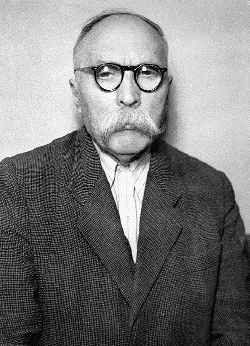
Born: August 23, 1883, Tarnopol, Russian partition of Poland (presently Ukraine)
Died: April 30, 1950, Warsaw (Rakowiecka Prison), Poland
Early days. Puzak was born on 26 August 1883 in Tarnopol (then Russia, between WWI and WWII - Poland, presently - Ukraine).
Joining PPS.Joined illegal PPS (Polska Partia Socjalistyczna = Polish Socialist Party) in 1904.
In 1906 PPS was split into two parties - Puzak joined PPS Frakcja Rewolucyjna (Revolutionary Fraction ) led by Jozef Pilsudski. Main goal of this party was Poland's independence.
Arrested and inprisoned.Arrested in 1911 by the Russians spent 6 years in Schlissenburg prison. After regaining freedom during the February revolution in 1917 he participated in PPS activities in Russia editing among others "Glos Robotnika i Zolnierza" (Worker's and Soldier's Voice).
Return to Poland.PPS functions.
Returned to Poland in 1918. During the interwar period Puzak was one of the leading activists of PPS. For 16 years he was representing PPS in the Sejm (Polish Parliament). From 1921 to 1939 he was the Secretary General of the Central Executive Committee of PPS (CKW PPS).
Creator of WRN.During the Nazi occupation Puzak was one of the creators and a member of leadership of the underground PPS WRN (Polska Partia Socjalistyczna Wolnosc Rownosc Niepodleglosc= PPS Liberty Equality Independence). Had the pseudonym “Bazyli.”
As a representative of this party he was a member of PKP (Polityczny Komitet Porozumiewaczy= Coordinating Political Committee) which coordinated activities of Polish underground parties.
He was commander-in-chief of Gwardia Ludowa WRN (People's Guard WRN) which was the military organization of the PPS, and a member of ZWZ-AK (Zwiazek Walki Zbrojnej - Armia Krajowa = The Union of Armed Struggle - Home Army). On September 1, 1944 the delegate of the Polish Government in Exile (in England) Stanislaw Jankowski formed RJN (Rada Jednosci Narodowej = The Council Of National Unity) - the parliament of the Underground Poland.
President of RJN. Puzak became this Council's President and played a decisive role in formulating the programmatic declaration "What the Polish nation is fighting for?." Puzak was against any cooperation with the communists.
During the Warsaw Insurrection (Aug.1 -Oct.1, 1944) Puzak was in Stare Miasto (Old Town - a district of Warsaw) from which he reached Srodmiescie (downtown district of Warsaw) using the main sewer. After the capitulation of the capital he left the city together with the civil population and continued his underground activities.
Korbonski about Puzak.Stefan Korbonski wrote about him: "From his entire underground activities emerges a person with inflexible character and obstinacy in his drive to achieve the goals. He was an ardent patriot but no one ever heard a patriotic cliche from his mouth. He considered a sacrifice, death in the struggle or prison as something normal not subject to discussion and self-explanatory."
When after the occupation of Poland by the Soviet Army the NKVD general Ivan Sierov proposed talks to the underground leaders, Puzak suspected deceit. Another of PPS/WRN leaders, Zygmunt Zaremba recalls: “Even today I remember the sad face of Kazimierz Puzak … he said ‘I don’t know whether we’ll meet again.’ I protested with a word or a gesture. ‘No, no. What I said is not only an expression of foreboding but also my knowing the Bolsheviks.’ Familiarity with Bolsheviks proved to be correct.
Abducted by the Soviets; sentenced to prison. Was abducted together with 15 other leaders of Polish underground state and transported to Moscow and subject to a murderous interrogation. Several months later he recalled: “The interagotion in the USSR is original also in that the accused doesn’t get the indictment formulated with all the facts (…) but he must himself give the facts from his activity and from everyday life on the basis of which
Return to Poland.In November 1945 returned to Poland and joined the underground activities of PPS WRN.
Zygmunt Zaremba recalls: “The conversation turned to actual problems. I presented to him a report of political and organizational situation. Puzak bit his moustache and suddenly erupted with bitterness and passion –‘A policy of an agreement with the Soviets that’s a terrible stupidity. Its authors will be shamed and done in by the Soviets. They throw them away later like used rags. And before that they will have to swallow various meanness. The only way – to stand consistently at the principles of true independence (…). One winter day at the beginning of 1946 I saw Puzak for the last time. I repeated then a suggestion made many times before ‘Let’s leave together.’ ‘No. I’m too old to emigrate. I must end my road here…(…). He refused all later proposals to emigrate. He didn’t feel strong enough to start a life of an émigré. But he had enough strength to face the danger every day and wait for the inevitable catastrophe. Undoubtfully with his realistic mind he understood very well that the Bolsheviks won’t let him enjoy for long even this relative freedom.
Arrest in Poland; incarcerationPuzak was arrested in 1947 and next year sentenced for 10 years prison term. During his incarceration he was subject to various harassments. For instance one replaced his blanket by a square one… During the visitations his daughter tried to convince him to ask Bierut for pardon. He never agreed to this.
Kazimierz Puzak died April 30, 1950, in the Rakowiecka Street prison.
On the basis of the Polish original prepared by Pawel Pawlaczyk , Ruch Odbudowy Polski, led by Jan Olszewski one of the leading conservative politicians.See:
Pawlaczyk
See also WIEM.
Return to home page:
Prominent Poles